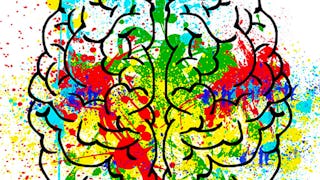Filter by
SubjectRequired
LanguageRequired
The language used throughout the course, in both instruction and assessments.
Learning ProductRequired
LevelRequired
DurationRequired
SkillsRequired
SubtitlesRequired
EducatorRequired
Results for "thinking styles"

Imperial College London
Skills you'll gain: Creative Thinking, Brainstorming, Design Thinking, Ideation, Creativity, Creative Problem-Solving, Problem Solving, Innovation, Critical Thinking, Artificial Intelligence, Systems Thinking, Generative AI, Prototyping, Decision Making, Analysis

University of Virginia
Skills you'll gain: Design Thinking, Creative Problem-Solving, Ideation, Innovation, Creativity, Strategic Thinking, Human Centered Design, Storytelling, Empathy, Leadership
 Status: Free
Status: FreeStanford University
Skills you'll gain: Mathematical Theory & Analysis, Mathematics and Mathematical Modeling, Calculus, Deductive Reasoning, General Mathematics, Logical Reasoning
 Status: Free
Status: FreeImperial College London
Skills you'll gain: Creative Thinking, Brainstorming, Ideation, Creativity, Resourcefulness, Curiosity, Problem Solving, Analytical Skills, Collaboration, Analysis

Institute for the Future
Skills you'll gain: Forecasting, Visionary, Innovation, Proactivity, Strategic Thinking, Augmented and Virtual Reality (AR/VR), Creative Thinking, Action Oriented, Simulations, Optimism, Ideation, Planning, Community Organizing, Systems Thinking, Independent Thinking, Dealing With Ambiguity, Trend Analysis, Brainstorming, Empathy, Market Trend

University of Virginia
Skills you'll gain: Brainstorming, Design Thinking, Innovation, Ideation, Creative Thinking, User Research, Human Centered Design, Creative Problem-Solving, Stakeholder Management, Design Research, Project Scoping, User Experience Design, User Experience, Persona Development, Project Planning, Service Design, Process Mapping, Product Development, Growth Mindedness, Creativity

Skills you'll gain: Problem Solving, Creative Problem-Solving, Creative Thinking, Root Cause Analysis, Professional Development, Complex Problem Solving, Critical Thinking, Analysis, Personal Development, Decision Making

Arizona State University
Skills you'll gain: Strategic Thinking, Data Storytelling, Visionary, Research, Influencing, Persuasive Communication, Strategic Decision-Making, Data Collection, Systems Thinking, Critical Thinking, Negotiation, Proactivity, Business Strategy, Complex Problem Solving, Communication Strategies, Forecasting, Creative Thinking, Scientific Methods, Decision Making, Active Listening

University of Virginia
Skills you'll gain: Design Thinking, Stakeholder Engagement, Innovation, Prototyping, Brainstorming, Storytelling, Human Centered Design, Ideation, Service Design, User Experience, Data Visualization
 Status: Free
Status: FreeYale University
Skills you'll gain: Psychology, Mental and Behavioral Health Specialties, Psychiatry, Mental Health, Human Development, Human Learning, Social Sciences, Psychotherapy, Behavioral Health, Sociology, Creativity, Non-Verbal Communication
 Status: Free
Status: FreeDeep Teaching Solutions
Skills you'll gain: Learning Strategies, Time Management, Willingness To Learn, Mental Concentration, Creativity, Persistence, Stress Management, Self-Awareness, Adaptability

Duke University
Skills you'll gain: Deductive Reasoning, Logical Reasoning, Computational Logic, Probability, Analytical Skills, Persuasive Communication, Decision Making, Research, Writing, Statistical Inference, Complex Problem Solving, Correlation Analysis, Interpersonal Communications, Interactive Learning, Learning Strategies
In summary, here are 10 of our most popular thinking styles courses
- Creative Thinking Tools for Success and Leadership: Imperial College London
- Design Thinking for Innovation: University of Virginia
- Introduction to Mathematical Thinking: Stanford University
- Creative Thinking: Techniques and Tools for Success: Imperial College London
- Futures Thinking: Institute for the Future
- Design Thinking: University of Virginia
- Solving Problems with Creative and Critical Thinking: IBM
- Strategic Thinking for Everyone: Arizona State University
- Design Thinking for the Greater Good: Innovation in the Social Sector: University of Virginia
- Introduction to Psychology : Yale University










